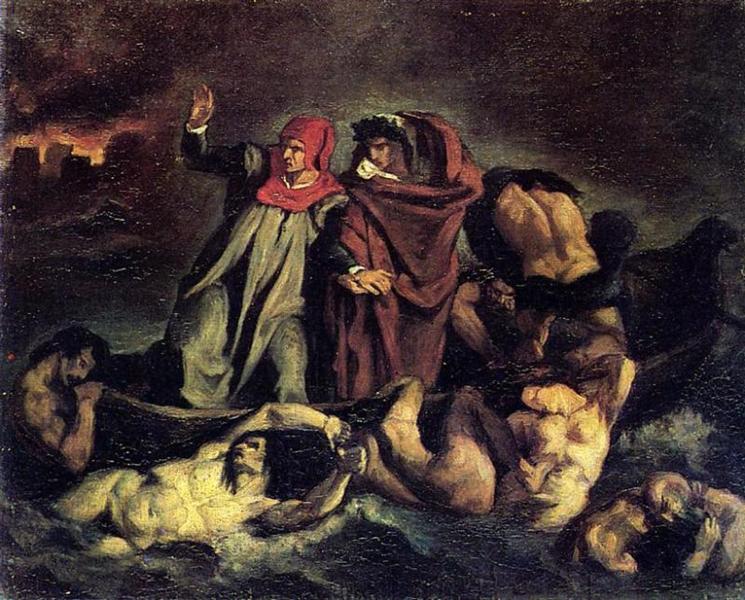Beskrivelse
The work "Dante's Bark" (Copy after Delacroix), painted by Édouard Manet in 1854, is a key milestone in the evolution of modern art, reinterpreting a classical theme and reflecting the young artist's admiration for his predecessor Eugène Delacroix. Manet, whose artistically significant career began in the post-Romantic period, delves into the vibrant narrative of "Dante's Bark," an original work by Delacroix that depicts Dante and Virgil in Hell, a symbol of the quest and redemption amidst human suffering.
Looking at Manet's composition, it is evident how he has maintained the basic structure of Delacroix's original, albeit with a distinctively personal touch. The austere depiction of the figure of Dante, who stands on the left, is surrounded by a group of tormented souls emerging from the shadows. The use of colour in this work is particularly striking; Manet opts for a palette that relies on deep, dark tones, but which, unlike the original, features a particular luminosity in the illuminated areas, hinting at the conflict between the light of hope and the darkness of pain.
The figure of Virgil, wearing an expression of determination, stands at the centre of the composition, acting as a guide for the lost souls, a visual device that contributes to the narrative of destiny and redemption. The characters are imbued with a palpable emotional intensity, their bodies seeming to move in a confined space, almost as if the boat itself were becoming a metaphor for human suffering; a representation of the never-ending struggle between good and evil, faith and despair.
Manet, who is known for his innovative approach, challenges the conventions of the day. His brushstroke technique, looser and less detailed than Delacroix's, allows the work to breathe and evolve, lending a dynamism that suggests movement and emotion. In this piece, Manet seems to be exploring the transition to Impressionism that would characterize his future work, by employing a treatment of color and light that foreshadows a break with academic formality. His choice of subject matter, moreover, reflects a renewed approach to art, seeking to express not only beauty, but also the anguish and complexity of the human experience.
When looking at Dante's Barque, one can discern the influence of literature on art, a connection that Manet emphasizes by depicting such a dramatic and literarily rich episode. This kind of intertextuality is not just an aesthetic choice, but a statement of intent; Manet places himself in the context of an artistic lineage that values narrative and the psychology of the individual.
Although Dante's Barque is a copy of an earlier work, it is notable not only for its technical execution, but also for its ability to invoke intense emotions and reflections on the human state. With this work, Manet establishes a bridge between the Romantic ideals of his time and the emerging movement of modernism, underlining his place in art history as an innovator and a pioneer who asserted his voice in a world of established conventions. With every stroke, Manet invites us to reflect on our own journey in life, making his work a mirror of the human soul that resonates even today.
KUADROS ©, a famous painting on your wall.
Hand-made oil painting reproductions, with the quality of professional artists and the distinctive seal of KUADROS ©.
Painting reproduction service with satisfaction guarantee. If you are not completely satisfied with the replica of your painting, we will refund 100% of your money.

